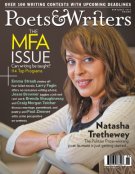It was a good night for writers: free books, free beer, and a comfortable venue in New York City packed with swarms of other writers, editors, agents, and publishers. For women writers, though, this was more than just another night of literary revelry; it was a fund-raiser for VIDA: Women in Literary Arts, an organization whose mission is to connect, engage, and empower women writers and address the critical reception of women’s writing in contemporary literary culture. The event was held in late June at Brooklyn Brewery, tucked away in the industrial side streets of north Williamsburg, the bar’s giant steel casks towering over a thick and energetic crowd. The party was hosted by Riverhead Books, the publisher that, according to Ruth Franklin’s 2011 New Republic article comparing a selection of publishers, came closest to gender parity in the titles it publishes. (At the time the article was written, 55 percent of Riverhead’s authors were men and 45 percent were women. Next in line was Random House, with female authors comprising 37 percent of its list; and the rest—from Knopf and Norton to Graywolf and Melville House—tallied 25 percent and under). In light of the startling numbers, Riverhead decided to throw VIDA a party, in the hope of raising some much-needed funds for the fledgling organization.
VIDA was founded in 2009 by poets Cate Marvin and Erin Belieu, who recognized this disparity—and the lack of dialogue surrounding it—and decided to do something about it. The nonprofit organization is run by women all across the country who work within a broad range of disciplines and share the common goal of creating a space where women can exchange ideas, build a professional network, and be heard.
“One of our main goals is to pull women into the critical discourse,” says Marvin, whose third poetry collection, A Trembling, is forthcoming from Norton in 2013. “By not being involved in the discourse, we’re not addressing the issue.” To encourage that discourse, VIDA has created a supportive online community for emerging and established writers. VIDA’s blog, Her Kind, which was launched in May and serves as the main artery of conversation on the organization’s website, offers three ways for a writer to participate: serve as a guest blogger, submit essays or opinion pieces, and begin conversation threads with other writers.
“We want to build genuine relationships,” says membership coordinator Jennine Capó Crucet, adding that VIDA hopes to establish an income-based membership system and expand its website to include a directory and a forum where writers can find out about events, programs, and resources in communities across the country.
To tackle the disparity directly, VIDA publishes the Count, a series of pie charts that breaks down, by gender, the bylines and subjects of book reviews published in some of the most widely read literary publications, such as the Atlantic, Harper’s, the Nation, the New Yorker, and the Paris Review. “It is sobering to realize that we may live and work in a world still held in the grip of unconscious biases, no less damaging for their invisibility,” says Franklin, who penned her 2011 article for the New Republic in response to VIDA’s inaugural publication of the Count.
Published annually on VIDA’s website, the Count seeks to make such biases visible. And while the numbers remain stark, simply making the information available has helped VIDA accomplish its first mission: to get people talking.
“We’ve managed to achieve much of our original goal—to rejuvenate the conversation around feminist issues in contemporary writing and to raise people’s consciousness that such issues still exist,” says Belieu, author of three poetry collections published by Copper Canyon Press, most recently Black Box (2006), and director of the MFA program at Florida State University. The Count challenges publishers to tally their own numbers to see how they stack up, and many have begun to do so.
Late into the evening, as the crowd was just beginning to thin, an exuberant Jynne Martin—Riverhead’s director of publicity, who organized the fund-raiser—perched on one of the brewery’s long, communal benches and spoke passionately about the press’s goals, and the impetus for the party. “Part of Riverhead’s mission is to establish a foundation of support for women writers,” she said. “And VIDA speaks to that mission.”
Founded in 1994 as an imprint of Penguin, Riverhead boasts an impressive list of female authors, some of whose books were handed out to party guests by vice president and publisher Geoffrey Kloske. More than three hundred advance tickets were sold for the event, and a hundred more tickets were purchased at the door. VIDA plans to use the funds for future programs such as regionally based critical prose workshops and “VIDAships,” which will offer money, time, and space to promising women writers. “We want to start a national mentoring program,” says Belieu, “to encourage women to grant themselves permission to more fully enter into the critical conversation surrounding contemporary literature.”
In the end, Belieu says, that conversation, along with cultural pressures and the ensuing struggle to balance professional, creative, and personal lives—which can often result in the sacrifice of artistic goals—are the challenges that most women writers face every day, and which VIDA plans to confront head-on.
“Shouldn’t there be a way for us to honor everyone’s dreams and ambitions?” Belieu asks. “Don’t we have the creativity, largesse of spirit, and organizational skills to make that happen? That’s a central question for VIDA. There’s room for a lot more voices than we read now.”
Melissa Faliveno is Poets & Writers Magazine's Diana and Simon Raab Editorial Fellow.










Comments
actsofswine replied on Permalink
Great piece
About a very necessary organization. Great job.